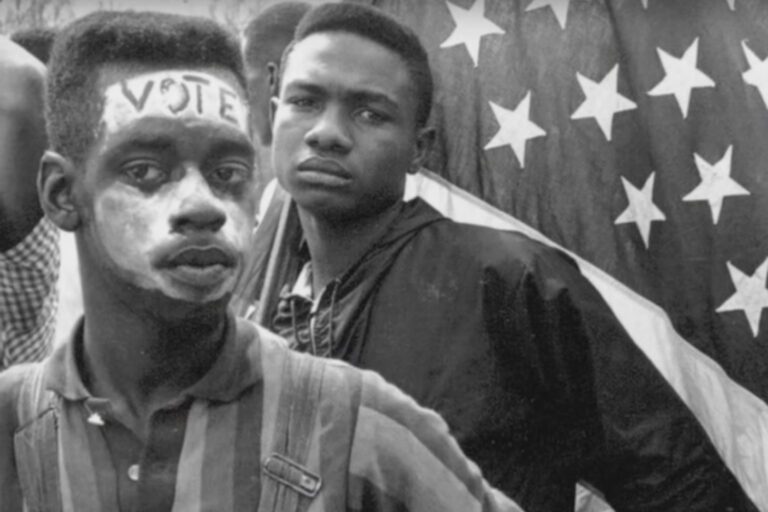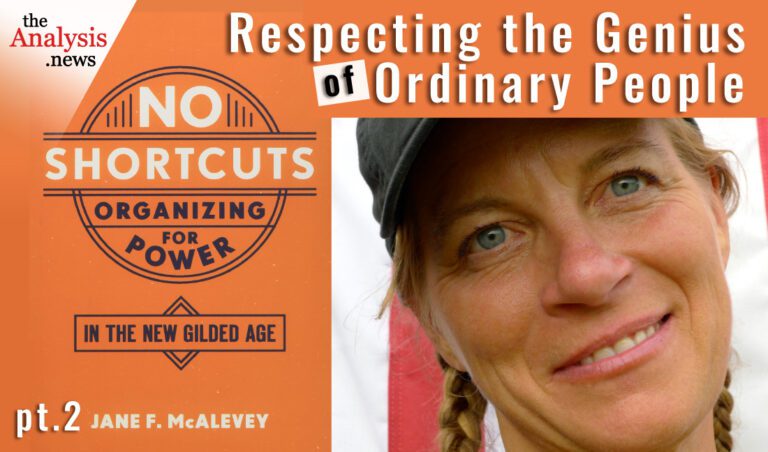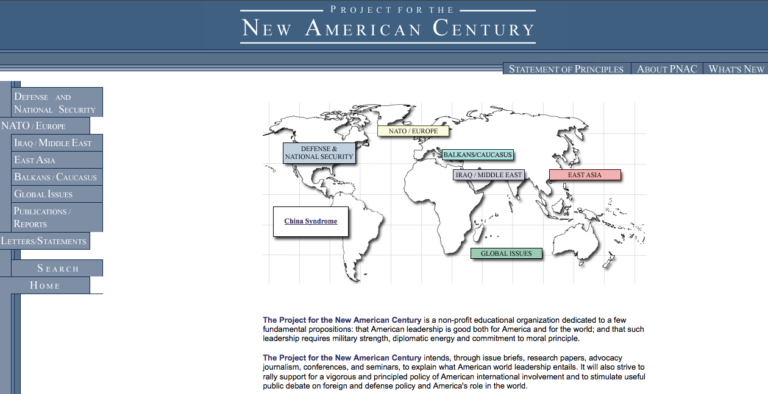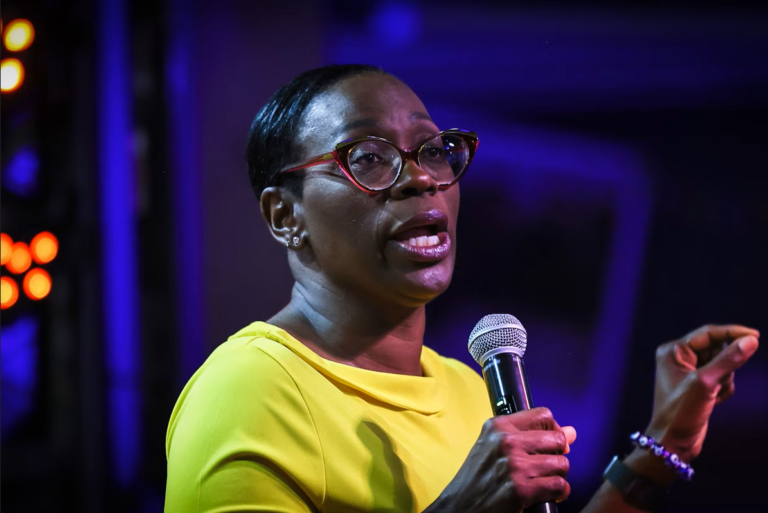Mr. Ratner tells Paul Jay that Reagan ushered in a period of murderous suppression of opposition to US hegemony in Latin and Central America. This is an episode of Reality Asserts Itself, produced March 12, 2014 with Paul Jay.
STORY TRANSCRIPT
PAUL JAY, SENIOR EDITOR, TRNN: Welcome back to The Real News Network. I’m Paul Jay in Baltimore.
We’re continuing our series on Reality Asserts Itself with Michael Ratner, who now joins us in the studio again.
Michael’s president emeritus of the Center for Constitutional Rights in New York. He’s also a board member of The Real News Network. And you’ll see lots more of his bio down below.
Thanks for joining us again.
MICHAEL RATNER, PRESIDENT EMERITUS, CENTER FOR CONSTITUTIONAL RIGHTS: Good to be with you again, Paul.
JAY: So the Vietnam War winds up in 1975. The late ’70s is a period of not just exhaustion with the war, but the anti-imperialist questioning, the denunciation of American foreign policy, the role of the CIA–there’s a kind of a pushback in public opinion, and even at the political level, of just the kind of activities the United States has been up to. So where are you in all this? ‘Cause I would think the CCR is in the middle of a lot of this.
RATNER: Well, it was an interesting period, for sure, because you had Carter elected, and really you saw the claws of U.S. imperialism at least cut back a tiny bit. We had the War Powers Resolution, which required a certain kind of consent from Congress, but where you could go to war, Congress trying to blame the executive, even though Congress deeply supported the war with money and everything else. You had restrictions on the CIA. You had hearings about the massive surveillance carried out by the CIA in the United States, as well as by the FBI and COINTELPRO and the destruction of the black movement, etc. You had a lot of this stuff come out. And you actually saw what I would say a blunted foreign policy in terms of use of U.S. force overseas, etc.
As you get toward the end of Carter, what you begin to see, though, is the beginning of the furnishing of some military aid into Central America. Central America is beginning to–.
JAY: Just before, we just should add the Carter-Brzezinski and Afghanistan. There’s a very important piece there where Carter signs a memo which, in the context of all that, says no lethal force supplies should be given to the Afghan jihadists, the anti-Soviet fighters, but in fact money goes through Pakistan–beneath the cover of this memorandum, they are in fact sending lethal support. So the whole beginning of what we now see in the Middle East, Carter and Brzezinski are kind of in the middle of it all.
RATNER: I think that’s really important [crosstalk]
JAY: But it’s a bit off the radar in terms of people’s understanding that it’s what’s happening.
RATNER: It’s certainly off the radar for me during that period. I mean, I know it now because Brzezinski still brags about the fact that he did that,–
JAY: Brags about it.
RATNER: –even as a way of pushing the Soviet Union out of Afghanistan.
Now, of course, as you said, it is the beginning of the end in Afghanistan, and we’re where we are today because of that decision made by this so-called antiwar president, along with Brzezinski, to arm the insurgency in Afghanistan, including jihadists. So it was something that was–as I recall, was not on the radar at all. What was on the radar was that the Soviets were doing bad things in Afghanistan and all of that. That was all over the papers. But in terms of public radar, not a lot.
In terms of my own life, I was by that time, after being in Cuba and Puerto Rico and defending a lot of militants in the United States during the late ’70s, from the Black Liberation Army to Puerto Rican activists to others–I had looked at it at least in terms of the area of the world that I was really working on, which was Central and South America, as a pushback against the United States in that Carter wasn’t doing a lot in those countries at that point to repress change. And, in fact, on his watch, two revolutions happened. In 1979, in July 1979, the Nicaraguan Sandinistas actually had a victory, and it became a Sandinista revolutionary government. In, as I recall, March before that, March ’73, you had the New Jewel Movement take over Grenada. And at the same time, you had insurgencies that were quite strong, particularly in El Salvador, with widespread human rights violations by the government, really moving quite along. That was the FMLN, the FSLN in Nicaragua, FMLN in Salvador. And in Guatemala you had at least four or five guerrilla groups, insurgent groups, coming together to try and overthrow the military dictatorships of Guatemala. So you’re talking about the late ’70s with the U.S. at least, because it got slapped on the wrists a little bit about Vietnam and the Congress and everybody else being nervous about the money, American soldiers, etc., not intervening so directly in the ’70s wars in Central America.
And so, as Reagan runs for office–and remember, Carter is a one-term president, perhaps in part because of Reagan’s salesmanship on this issue. Look what’s happened under his watch. Nicaragua had a revolution. You know, Grenada, this tiny little 90,000 person island in the Caribbean, they’re controlling our oil and shipping lanes all over the world, essentially, from this little island. And that’s–Reagan’s running on that policy. Carter loses the election.
I can tell you that despite having had Nixon and Vietnam, that we were utterly shocked as progressives that Reagan had won and what that would mean for us as progressives and what it would mean for others in the world, because accompanying Reagan’s victory was a big, thick book called Mandate for Change, written by a right-wing foundation called the Heritage Foundation. And this was really the culmination of probably what the right wing had been doing, which was funding foundations and other think tanks to begin to set the agenda, which became the agenda, let’s be honest. But it became the agenda through today. What really happened from Reagan forward is more or less, even with Clinton, adopted a number of the suggestions of these right-wing think tanks from welfare and work to various restrictions on the death–on challenging the death penalty, to the right of habeas corpus, to wiretapping, to all of these things. This really–I would put it from Reagan’s election forward.
But what it meant for my work was very, very important, because by that period I’m already working a lot. I’ve been working in Puerto Rico and Cuba. And we’d done work in Chile in the ’70s, after the Allende coup. And I was starting to work with a group of people who were–they ran a magazine called CovertAction Information Bulletin, Bill Schaap, Ellen Ray, Lou Wolf, and Philip Agee.
Philip Agee wrote Inside the Company. He was a CIA agent, exposed the names of 200 and some agents doing nothing but dirty tricks in Latin America and Central America, I mean, forming their own unions, killing union leaders, etc., all kinds of really bad, bad stuff. Phil turns renegade agent, exposes the names of the agents. This magazine is out there to publish the names, not just that these exposed, but new names.
I become the lawyer for the magazine, and that begins sort of my real work on the ground in Central America with that magazine and with Phil and with others.
At that point, they eventually pass a law that maybe our viewers are familiar with, the Agent Identities Protection Act, which prohibits people from naming CIA agents if it’s part of their business to do, aimed particularly at my client at that time, CovertAction Information Bulletin.
But because of that, I’ve gotten more and more involved in the revolutionary struggles in Central America. And I did a lot of that work both in Cuba and in Central America. Cuba–and you have to be frank about it–was very supportive of revolutionary struggles in Central America for many years before that, from Che going forward. And while they had to have all kinds of relationships with governments on one level and–but they were very supportive of the Sandinistas. In fact, Daniel Ortega in the ’70s, before the revolution, had lived in Cuba. I mean, this was not small.
And so my work during that period–and I can just talk about a little bit of it–it was in part solidarity work, but in part it was using legal means to try and bring the war to people’s attention in a legal way, in a cultural way, and to try and get some changes in it. It involved across-the-board work.
But in Nicaragua–I can just give you one instance–no one knew–you know, it was a secret–the Contras were secret. It wasn’t publicly announced that Reagan was supporting and arming the former people who ran Nicaragua to go into the country from both Honduras in the north and Costa Rica in the south and to squeeze the Sandinistas and kill them.
JAY: And doing so illegally.
RATNER: Right, completely illegally, outside of Congress authorization, and doing it in a way that killed not just militants and soldiers but killed, you know, aid workers, killed farmers, raped people. One of my first clients was a woman, a Miskito woman from the Atlantic coast, one of the indigenous leaders who’d been raped, you know, scores of times by the Contras. And so I wound up doing a great deal of work in many of those countries, but particularly Nicaragua, to try and stop the onslaught of what the U.S. was doing.
JAY: Is it this point where you establish a precedent that there can be a lawsuit waged in an American court for a violation of rights outside the United States?
RATNER: It was–that lawsuit happened in 1980. That’s correct. It wasn’t me personally, it was the Center, but that’s one I certainly used. The idea of that lawsuit (that’s called the Filártiga case) was based on a Paraguayan man whose son was tortured in Paraguay. The torturer then came to the United States, a government official torturer. And we successfully sued that torturer in the United States on behalf of a Paraguayan father and sister and the son, who was tortured, for an incident that took place entirely in Paraguay. And yes, that has led to my first really big case on behalf of people killed and tortured by the Contras in Nicaragua, and that was this Miskito Indian.
It was other people who’d been tortured. And what we did was I went through Nicaragua. I went into the highlands, I went to different places, interviewing people who’d been tortured or their families killed. And we eventually brought a lawsuit against Reagan, members of the National Security Council, and others for illegally arming the Contras and fighting an illegal war. And part of the purpose of the lawsuit, not that I expected to win, but was to expose to the American people that there’s this entire secret war going on and you ought to be aware of it. And we brought up the people who’d been tortured, we put on theater plays with them, we did a whole bunch of ways of trying to bring public attention to that illegal war. I probably, with other people at my office, some of the lawyers, and activists, brought a dozen lawsuits on various aspects of Nicaragua, El Salvador, the Contras. It was a very active period of my life, really not just supporting U.S., get your hands off Central America, but really wanting to support revolutionary movements for change in those countries.
And, of course, the mass slaughter was incredible, and the things I saw on the ground were horrible.
JAY: For example?
RATNER: Well, horrible. I went up to one village in northern Nicaragua, and there were, you know, little girls laid out in their coffins with flowers around where Contras had attacked them and killed the little girls. I represented a man named–an American named Benjamin Linder. Ben Linder was there as an aid worker, was building a dam in a place called Jinotega in Nicaragua that would give electricity. It was a little, you know, small dam for the little village, and the Contras shot at the dam, and then, when he was laying on the ground, they execute him point-blank, 26-year-old U.S. engineers. I mean, the atrocities done by the Contras were just–were numbing, were just numbing.
JAY: And considered by Reagan to be heroes.
RATNER: Yes. The Contras were considered to be heroes. They were armed. When Congress finally said affirmatively, you can’t fund them anymore, that’s when the Iran-Contra scandal happened, that’s when the U.S. essentially traded arms with Iran, traded–what was it again? It was–they had a deal with Iran that Iran would supply arms to the Contras because the U.S. Congress couldn’t. I guess they paid Iran, you know, a certain amount of money, all probably related to the hostage crisis that–at the end of the Carter administration, that the deal was all in the works.
JAY: You know, when you look back on that period, the level of brutality that Reagan was responsible for, the number of lives he’s responsible for internationally, never mind what he did in terms of domestic policy, and now he’s this loved president–if you ask people their best presidents, Reagan’s often on the list. I once saw an interview with President Obama about the roots of his foreign policy, and he started with Truman but included Reagan in the legacy of a foreign policy he could embrace.
RATNER: I saw that interview. And the School of the Americas during that period was giving out books of how to torture people in interrogation. Two hundred thousand people were killed in the highlands in Guatemala. U.S. was supplying the Guatemalan military with arms. Tens of thousands were killed in El Salvador.
The U.S. finally put in–the Congress put in some human rights obligations in their law that said, El Salvador, we’re going to cut off the aid unless, you know, the human rights situation is better. The president has to certify (Reagan, in this point) every six months that it’s getting better. And, of course, Reagan certified every six months that it’s getting better.
I represented, actually–she’s a senator from here now, from Maryland–I represented–she was a representative then, Barbara Mikulski then. And Barbara Mikulski was very good on the war, against the war, incredibly good. And she was one of the plaintiffs in one of my lawsuits to try and stop some aspect of the El Salvador war, as I recall. And after the president certified, president certifies, according to congressional law, aid can continue, human rights are getting better, he says, [incompr.] continue, I got on the phone with–I think it was Barbara–and she said, you know, can the president call a duck an eagle? And I said, I’m afraid he can. Of course, we litigated it and lost.
But there were a number of heroic people during that period. But, you know–and the Catholic Church played–it was the liberation theology church–it played a very strong role in a positive way in Salvador in particular, and they killed Archbishop Romero early on in that war.
But it was an–I think your point is right, Paul, and it’s an important one. It was one of the most brutal excesses, you know, that I had certainly experienced in my life in Central America in that period. You know, and those countries are still–Guatemala is still a decimated, decimated country.
And then, of course, we invaded Grenada in 1983 under Reagan; we invade Grenada. There’s an internal conflict. Who knows what role our country had in it. Maurice Bishop, the head of Grenada, who I was acquainted with, was murdered. And then the U.S., on an excuse of having to save Americans at a medical school there, invades.
And it was an illegal war, of course, completely illegal war. I went to court on behalf of Congressman Dellums at the time and some others. And, of course, by the time I got to court and got the judges to rule clear illegal war, the war was over. It was a four-day invasion.
So this was a incredible–it was propaganda all the time about it, about oil lanes and shipping and communism. There were false reports, you know, about, you know, arms coming in. It was just a complete propaganda effort to get the American people on the side of destroying these progressive and revolutionary changes.
We actually thought–and this is, of course–I would look back, not naive, but you never know at what moment, of course, you’re going to bring down at least part of the imperial structure, and maybe each part of these–each of these maybe puts a chink in it. You don’t know. But we actually thought because it was so hot in Central America at that point, we actually thought that we were going to win and that it was a really serious moment. And then again we saw the United States come in.
And, you know, in 1988, that was the last–that was really the end of my work, in a way, in that–in my concrete work there, ’cause that’s the year the Sandinistas lost the election. And what you could say happened–sure, the Sandinistas made errors, mistakes, and all this, but what happened is the people were sick and tired of being at war with this behemoth to the north, and they could never, never win, and they were being killed, the place was economically destroyed, and they voted the Sandinistas out of office. And so you just see the power of this country.
And so I don’t know how I look back at the period. Sure, I think it was an important struggle, it was the right struggle. But on the other hand, you just see the power of this country.
JAY: But did it leave you feeling a little pessimistic?
RATNER: Well, I was–actually, ’88, I think it’s at that moment. After ’88, I actually changed my life for a period of time. I decided that I would take off a few years and go teach law school, teach human rights, you know, at various law schools. And that’s what I did. And it was–sure, I stayed active in various countries and other places–Cuba I still work with; I still work with, you know, whatever remains of covert action.
JAY: But it took some steam out of you.
RATNER: It definitely did. It was a period that we really thought we were winning. But the cost was incredibly high. And, sure, you could look back on it today and say, well, yes, I mean, obviously it’s changed in Latin America, it’s changed in Central America to a certain extent. You have–you know, whatever people’s opinion are of Daniel Ortega, it’s still Daniel Ortega leading that country.
JAY: And big changes in Venezuela and Bolivia and Ecuador and–.
RATNER: Right. Right. In South America it’s a real shift.
JAY: But in that period for you, it took some steam out of you.
RATNER: Right, in that period for sure, and I went off and I taught.
And then I didn’t–and, sure, we still took on whatever wars the U.S. was involved in. I can’t remember which one was next.
My whole life–and that’s [incompr.] I’ve been–really, in that sense, my antiwar stuff goes back to being a child. I wrote a poem when I was in eighth or ninth grade saying I would never go to war. And I’ve been consistent. And it’s been–of all the issues, I think, of the United States that’s been the hardest to make a dent on, it’s war. And they have been at war, I mean, since your age or my age, since I’ve been–not just the Second World War, but then the Korean War, and every year of my life the U.S. has been at war, essentially.
JAY: And, importantly, both parties.
RATNER: Right, both parties. This is not a one-party war, no, not at all. And that, I would say, of all the issues I’ve had to try and tackle–and, of course, I’m only one person, but, I mean, all of us have had to tackle, it’s been–it’s imperialism, hegemony, but it’s the use of war to finally say to people, you go against us and we’ll kill you.
JAY: Okay. We’re going to continue this series of interviews with Michael Ratner on Reality Asserts Itself on The Real News Network.






